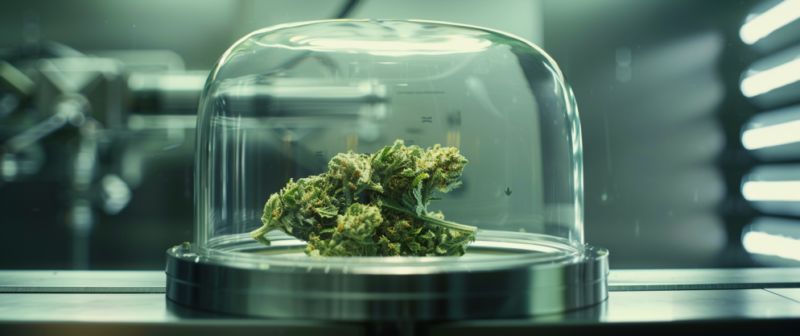How Long Till Delta 8 Leaves Your System
Understanding how long till Delta 8 leaves your system is crucial for individuals who may undergo drug testing or want to gauge when its effects will wear off.
Delta-8 THC, a cannabinoid with psychoactive properties, interacts with the body in various ways, leading to its accumulation and subsequent elimination. In this article, we’ll highlight the mechanisms of Delta-8 THC metabolism, look into factors affecting its elimination, and provide insights into approximate timelines for its clearance from the body.
How Long Does Delta 8 Stay In Your System?
Typically, Delta-8 THC can be detected in urine for up to 2-7 days after use. However, this timeframe can extend to several weeks for heavy or chronic users.
Related Post:
Can Delta 8 Cause Permanent Damage? Answering Controversies
While Delta-8 THC typically has a shorter duration of effects compared to Delta-9 THC, it can still linger in the body for a period after consumption. The duration that Delta-8 THC remains detectable in your system can vary based on several factors, including:
- Metabolism: Individual metabolic rates play a significant role in how quickly Delta-8 THC is processed and eliminated from the body. Those with faster metabolism may clear Delta-8 THC more rapidly than individuals with slower metabolism.
- Frequency of Use: Regular use of Delta-8 THC can lead to its accumulation in the body’s tissues and fluids, prolonging its presence. Chronic users may have higher levels of Delta-8 THC in their system compared to occasional or first-time users.
- Dosage: The amount of Delta-8 THC consumed can impact its duration of action and elimination. Higher doses may result in more prolonged detection times, as larger amounts of the compound need to be metabolized and excreted.
- Route of Administration: The method of Delta-8 THC consumption can influence its bioavailability and metabolism. Inhalation methods, such as vaping, typically result in more rapid onset of effects but shorter duration compared to oral ingestion, which may have a slower onset but longer-lasting effects.
- Body Composition: Factors such as body weight, fat percentage, and hydration levels can affect how Delta-8 THC is distributed and metabolized in the body. Individuals with higher body fat may store Delta-8 THC for longer periods, leading to extended detection times.
- Liver Function: Metabolism of Delta-8 THC primarily occurs in the liver, so any liver impairment or dysfunction can affect its clearance from the body. Individuals with compromised liver function may metabolize Delta-8 THC at a slower rate, leading to prolonged detection times.
- Genetics: Genetic variations can influence how efficiently enzymes in the body metabolize Delta-8 THC. Certain genetic factors may result in faster or slower metabolism of the compound, impacting its duration of action and elimination.
- Drug Test Sensitivity: The sensitivity and specificity of the drug test used to detect Delta-8 THC can affect its detectability window. Some tests may be more sensitive and capable of detecting lower concentrations of Delta-8 THC, leading to longer detection times.
- Hydration Levels: Adequate hydration can support the body’s natural detoxification processes, potentially speeding up the elimination of Delta-8 THC. Conversely, dehydration can slow down metabolism and prolong the presence of Delta-8 THC in the body.
- Concomitant Substance Use: Concurrent use of other substances, such as alcohol or medications, can interact with Delta-8 THC metabolism and affect its clearance from the body. Combining Delta-8 THC with other substances may prolong its detection window or lead to unpredictable interactions.
How Does Delta 8 Affect The Body?
Delta 8 THC interacts with the body’s endocannabinoid system, impacting various physiological processes and potentially influencing metabolism, urine output, and blood circulation.
The interaction of Delta 8 THC with the endocannabinoid system can lead to an array of effects on the body. This cannabinoid’s influence on metabolic functions can impact energy regulation and weight management.
Its effects on urine output may affect hydration levels and kidney function. In terms of blood circulation, Delta 8 THC’s interaction with the cardiovascular system could impact heart rate and blood pressure.
What Are The Short-Term Effects Of Delta 8?
Short-term effects of Delta 8 THC may include feelings of euphoria, relaxation, and altered perception, with potential impacts on metabolism and overall body functioning.
These immediate effects of Delta 8 THC often manifest swiftly after consumption, offering a sense of mild euphoria and relaxation that can help alleviate stress and anxiety. Users may also experience a heightened perception of their surroundings, with colors appearing more vibrant and sounds more enhanced.
The metabolic influence of Delta 8 THC may lead to changes in appetite, resulting in increased cravings or, conversely, a decreased interest in food. This cannabinoid interacts with the body’s endocannabinoid system, which plays a crucial role in maintaining homeostasis and regulating various physiological processes.
What Are The Long-Term Effects Of Delta 8?
Long-term exposure to Delta 8 THC may potentially impact overall health, metabolism, and physiological functions, with effects varying based on individual factors and consumption patterns.
Delta 8 THC interacts with the body’s endocannabinoid system, influencing various biological processes such as pain perception, appetite, mood regulation, and immune function.
Prolonged use of Delta 8 THC may lead to changes in these systems, potentially affecting health outcomes over time. Research also suggests that Delta 8 THC may impact metabolic processes, raising concerns about weight management and energy balance.
The long-term effects of Delta 8 THC on the body are still being studied, emphasizing the importance of informed and cautious consumption.
How Is Delta 8 Metabolized And Eliminated From The Body?
Delta 8 THC undergoes metabolism primarily in the liver, where it is broken down into metabolites and eventually eliminated from the body through urine.
What Happens To Delta 8 In The Liver?
The primary metabolic breakdown of Delta 8 THC in the liver involves the action of enzymes, specifically the cytochrome P450 family. These enzymes convert Delta 8 THC into 11-hydroxy-Delta 8 THC, a potent metabolite that contributes to the compound’s effects.
Further metabolism leads to the formation of various water-soluble compounds, such as glucuronide and sulfate conjugates. These metabolites are eventually excreted through the urine, completing the elimination process.
Interactions with other cannabinoids in the body can influence the metabolic pathways of Delta 8 THC, affecting its overall metabolism and elimination.
How Is Delta 8 Eliminated Through Urine?
Delta 8 THC is primarily eliminated from the body through urine, as metabolites are filtered by the kidneys and excreted, a process crucial for drug tests detecting cannabinoid presence.
Metabolite filtration in the kidneys plays a pivotal role in the elimination of Delta 8 THC. After consumption, Delta 8 THC undergoes metabolic processes in the body, resulting in the formation of various metabolites. These metabolites are then transported to the kidneys, where they are filtered out from the bloodstream and excreted through urine.
This urinary excretion process is key in drug screening tests aiming to detect traces of cannabinoids in the system. As the kidneys filter out these metabolites, they pass through the urine, providing a way for healthcare professionals to assess recent cannabis use.
How Long Till Delta 8 Leaves Your System?
The duration for Delta 8 THC to completely leave the system varies based on factors like metabolism, elimination rates, and the compound’s half-life.
Different individuals metabolize substances at varying rates, meaning the time taken for Delta 8 THC to exit the body can differ significantly. The process is influenced by how quickly the body breaks down and processes the compound.
Elimination routes, such as urine, feces, breath, and sweat, play a crucial role.
What Is The Half-Life Of Delta 8?
The half-life of Delta 8 THC, which signifies the time taken for the compound’s concentration to reduce by half, plays a crucial role in determining its presence duration in the body. Factors such as an individual’s metabolic rate and the body’s elimination processes are key determinants in this context.
A shorter half-life indicates that the compound will be eliminated more rapidly from the system, leading to a shorter duration of effects, while a longer half-life suggests a prolonged presence of the substance in the body. This information is valuable for individuals looking to manage their consumption and plan their activities accordingly.
How Long Does It Take For Delta 8 To Be Completely Eliminated?
The complete elimination of Delta 8 THC from the body depends on factors such as metabolism, body mass, and the compound’s half-life, which collectively determine the duration for complete removal.
Metabolism plays a crucial role in how quickly Delta 8 THC is broken down and eliminated from the body. Those with faster metabolic rates tend to process and excrete the compound at a swifter pace. Conversely, individuals with slower metabolism may take longer to rid their system of Delta 8 THC.
Body mass also plays a significant role in the elimination process. Individuals with higher body fat percentages may retain Delta 8 THC longer, as the compound is lipophilic and can be stored in fat cells.
Can You Speed Up The Elimination Of Delta 8 From Your System?
Enhancing the elimination of Delta 8 THC from the system can be influenced by metabolic factors and certain detox methods or increased water consumption.
Does Drinking Water Help Flush Out Delta 8?
Increasing water intake can potentially aid in flushing out Delta 8 THC from the body by promoting metabolic processes and supporting the elimination of metabolites through urine.
Water consumption plays a crucial role in the body’s ability to metabolize substances like Delta 8 THC efficiently. When you drink plenty of water, it helps to speed up the metabolic processes responsible for breaking down compounds in the body, including THC.
This enhanced metabolism can lead to quicker elimination of Delta 8 THC and its byproducts.
Are There Any Detox Methods That Can Remove Delta 8 From Your System Faster?
Certain detox methods may aid in expediting the removal of Delta 8 THC from the system, potentially influencing metabolic processes and enhancing the elimination of the compound.
One effective way to enhance the elimination of Delta 8 THC is through hydration. Drinking plenty of water helps to flush out toxins by increasing urine volume, ultimately speeding up the detoxification process.
Engaging in regular exercise can also play a crucial role in accelerating metabolism, which in turn can facilitate the breakdown and removal of the compound. Incorporating antioxidant-rich foods, such as fruits and vegetables, can support the body’s natural detoxification pathways, aiding in the efficient removal of Delta 8 THC.
What Are The Different Types Of Drug Tests That Can Detect Delta 8?
Various drug tests can detect the presence of Delta 8 THC, including urine tests, blood tests, and hair follicle tests, each with different detection windows and sensitivities.
Urine tests are commonly used due to their non-invasive nature and ability to detect Delta 8 THC for up to several days after use.
On the other hand, blood tests offer a shorter detection window but are highly sensitive, offering accurate results within a few hours of consumption.
Hair follicle tests have the longest detection period, spanning several months, making them ideal for detecting historical drug use patterns.
The choice of test method often depends on the specific requirements of the situation, such as the desired detection window and sensitivity level.
Do Standard Drug Tests Check For Delta 8?
Standard drug tests may or may not specifically target Delta 8 THC, as their focus varies based on the substances being screened, requiring specific testing measures for cannabinoid detection.
In terms of drug testing, the effectiveness of detecting Delta 8 THC depends on the method used and the sensitivity of the test. While some standard drug tests may pick up Delta 8 THC as a false positive for Delta 9 THC, there are now more sophisticated testing options available that can accurately pinpoint the presence of Delta 8 THC.
Employers and authorities are increasingly realizing the need for targeted testing to differentiate between different cannabinoids, ensuring a more precise assessment of an individual’s substance use.
Can Delta 8 Be Detected In A Hair Follicle Test?
Hair follicle tests have the capability to detect the presence of Delta 8 THC, providing insights into past drug consumption patterns and usage histories.
These tests offer a comprehensive approach to identifying substances like Delta 8 THC in the body, as they can trace back up to 90 days, giving a historical overview of drug use. By analyzing the hair shaft, the test can highlight long-term drug patterns, making it a valuable tool for identifying chronic drug users.
In terms of cannabinoid detection, hair follicle testing stands out due to its accuracy and ability to distinguish between different cannabinoids. It utilizes sophisticated testing methodologies to detect even trace amounts of substances, ensuring reliable results.
Final Thoughts – How Long Till Delta 8 Leaves Your System
Understanding how long Delta-8 THC remains in your system is essential for various reasons, including potential drug testing and managing its effects. From metabolism rates to hydration levels and detox methods, various factors can influence the duration of Delta-8 THC in your system.
By understanding these factors, individuals can make informed decisions regarding consumption and navigate potential drug testing scenarios with greater awareness. Whether considering short-term effects or long-term implications, awareness of Delta-8 THC’s presence in the body is vital for responsible use and health-conscious choices.
FAQ
1. How does the method of ingestion affect how long delta 8 stays in your system?
The method of ingestion can have an impact on how long delta 8 stays in your system. For example, smoking or vaping delta 8 can result in a quicker onset of effects but also a shorter duration, while edibles may take longer to kick in but can stay in your system for a longer period of time.
2. Are there any potential health risks associated with delta 8?
While delta 8 is generally considered to be less potent and have less potential for harmful effects compared to delta 9 THC, it is still important to use it responsibly and in moderation. Regular and excessive use of delta 8 can potentially lead to negative side effects, including dizziness, dry mouth, and increased heart rate.
3. Are there any ways to reduce the presence of delta 8 in my system?
If you are concerned about the presence of delta 8 in your system, the best course of action is to stop using it. However, if you have a drug test coming up, you can try using at-home detox kits or consuming detox drinks that claim to help flush out toxins from the body. It is important to note that the effectiveness of these methods is not guaranteed.


